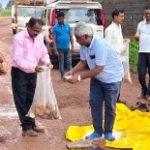New Delhi: The Odisha chief minister, Naveen Patnaik, Monday sought the Centre’s cooperation in improving railway, banking and telecom networks in the Mao-infested areas of the State.
Patnaik was speaking in inter-state council meeting on anti-Maoist operations, here on Monday. The meeting was presided over by union home minister Amit Shah.
Soon after meeting, Patnaik told media persons, ” I have demanded that the Left- Wing Extremists (LWE) infested areas of the state get better rail connectivity, telecom networks and banking facilities.” He said that the State government is willing to provide land free of cost and also bear half of the project cost of the railway projects connecting two Maoist disturbed districts of Malkangiri and Nabarangpur.
” I hope the Centre would comply to my demands”, the Odisha chief minister said.
The Home Minister also reviewed the anti-Maoist operations and also the developmental activities being undertaken in LWE-hit States.
The 10 Maoists-hit states are Chhattisgarh, Jharkhand, Odisha, West Bengal, Bihar, Maharashtra, Telangana, Andhra Pradesh, Madhya Pradesh and Uttar Pradesh.
Chief ministers of Uttar Pradesh Yogi Adityanath, Madhya Pradesh, Kamal Nath, Bihar Nitish Kumar, Jharkhand Raghubar Das, Chhattisgarh Bhupesh Baghel, and Odisha Naveen Patnaik attended the meeting . Besides, top police and civil officials of 10 Maoist-affected states attended the meeting.
Maoist-related violence has come down by 43.4% to 4969 cases between 2014-18 from 8,782 cases during 2009-13, as per home ministry data.
Similarly, the death due to Maoists violence has come down by 60.4% to 1321 in 2014-18 from as many as 3,326 in 2009-13.
Around 1,400 Maoists were killed during 2009-2018. As many as 310 incidents of Maoist violence have been reported in the first five months of this year across the country in which 88 people were killed.
LWE-related violence was reported in only 60 districts in 2018.
The National Policy and Action Plan, approved in 2015 to address LWE, envisages a multi-pronged strategy involving security-related measures, development interventions, ensuring rights and entitlements of local communities.
The government is also implementing a special central assistance for most LWE-affected districts with an annual outlay of Rs 1,000 crore to fill critical gaps in public infrastructure and services. (With agency inputs)






